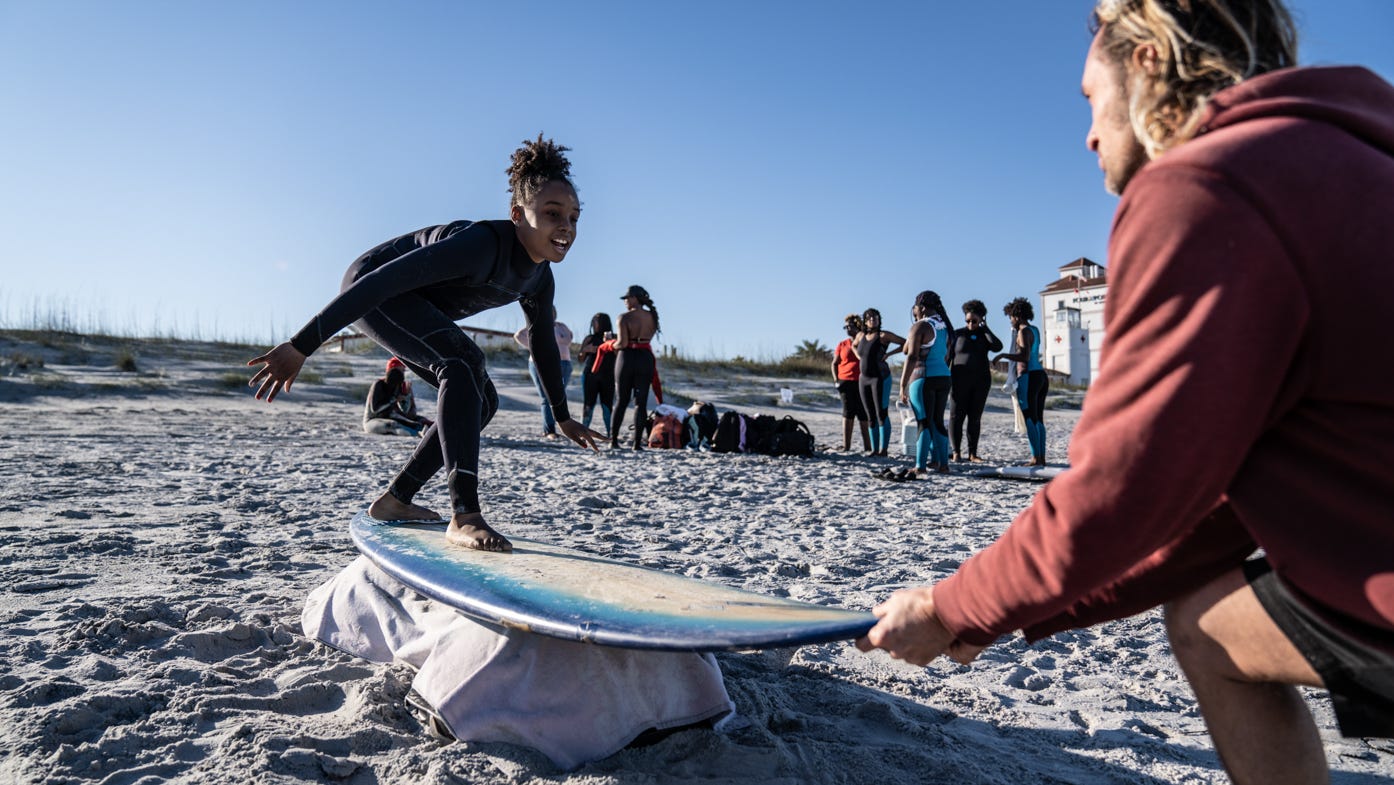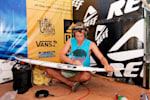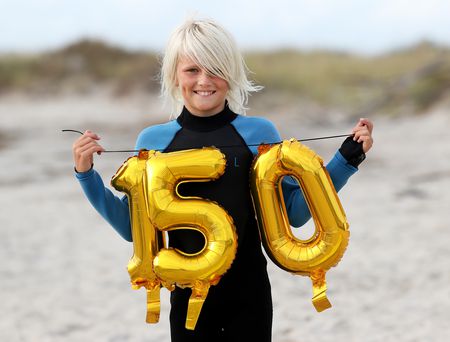From the deck of her parents’ boat in Tampa Bay, GiGi Lucas grew up watching orange sherbet sunsets and the nautical wonders of the ocean.
Lucas always loved being in the water, but it wasn’t until she was 35 that she discovered the true beauty of learning to surf in it.

“I was at a friend’s wedding in Costa Rica and everybody went zip-lining,” she said. “I went surfing. I never considered surfing as an option when I was a kid. I decided in my 20s that I wanted to learn how to surf before I turned 40. The wedding in Costa Rica was the perfect opportunity.”

Three years later, Lucas — a woman of color — created the 501c3 nonprofit, SurfearNEGRA, and has collaborated with Jacksonville neighbor Brianna Kilcullen’s company, Anact, on a venture to help introduce Black girls to the sport, break stigmas and stereotypes, and “diversify the lineup.”
“If a girl walking down the street can see that image (of me surfing), and she looks like me,” said Lucas, “we can make it accessible.”
The ¡100 Girls! campaign sends girls of color (ages 7-17) to camps in their community, while the ¡Surf The Turf! program brings specialized surfing apparatus to schools to teach the fundamentals of surfing in gyms.
“Due to Covid, we are in the process of converting the curriculum into a digital format which will be able to reach a lot more kids,” Lucas said.
“We’ve had a tremendous response … we just finished four camps in Jacksonville Beach; we have a network of about 75 camps in all that we can send our girls to.”
Black surfers hit hurdles
Black surfers, especially as role models, have been quite rare in this country.
For instance, there are no Black surfers in the East Coast Surfing Hall of Fame.
But in 2018, South Africa’s Mikey February broke the color barrier on the elite pro circuit when he replaced 11-time world champion Kelly Slater of Cocoa Beach, who bowed out of a World Championship Tour contest at Snapper Rocks, Australia.

February, who had earned the top qualifying slot in 2017, stepped in and made history, eventually replacing retired Mick Fanning a month later for a full-time role. He since has dazzled spectators with his skills and his reflections of his upbringing.
During the past NFL season, San Francisco 49ers running back Raheem Mostert gained a lot of popularity not only for scoring a touchdown in the Super Bowl but also for his background as a surfer at his hometown of New Smyrna Beach, considered the “Shark Attack Capital of the World.”
Sharks aside, diversity — particularly Black surfers — has been missing from the lineup and contests for decades. But, as Lucas explained, racism had much to do with that.
“The challenge of surfing diversity goes back in history to the restriction of people of color on beaches,” she said. “In 1968, (Black Americans) were finally free, and legally able, to go to (public) beaches. Even after the desegregation of all beaches, there were unwritten rules of people getting harassed, even by the police.
“There have been a lot of hurdles.”
The legacy of Black surfers can be traced to Nick Gabaldon who, in the 1940s, reportedly was the first documented African American surfer in the U.S.
As legend has it, he taught himself to surf at a roped-off 200-foot zone of beach, known at the time as “Inkwell Beach,” designated for African Americans in Santa Monica, Calif.
He began by using a paddleboard he borrowed from a lifeguard. As he progressed, he would paddle up the coast to Malibu, 12 miles away, to join the lineup of local surfers on the beach “Gidget” made famous just years later.
Ironically, it was there on June 5, 1951, where Gabaldon reportedly drowned after attempting to “shoot the pier,” or surfing those eight-foot waves that day through the wooden pylons. His body was found a few days later. He was 24.

Floyd’s death fuels mission
Earlier this summer, the death of George Floyd, killed during a police arrest in Minneapolis, renewed the call not only for police reform, but for justice and racial equality.
“If anything, it sparked the idea of collaboration, that representation matters,” Kilcullen said. “So, I guess, this is my way to show protest, to create change to bring awareness, to facilitate diversity (in surfing).”
Paddle-outs to honor Floyd in surfing communities stretched from Australia to Senegal to Satellite Beach.
Lucas, 41, pointed out that the SurfearNEGRA-Anact collaboration is focused on the United States because many of the challenges here are a direct result of specific events in U.S. history.
Diversity in the water isn’t necessarily a topic of conversation in most communities, because “when everyone looks like you, sometimes you don’t notice the lack of diversity,” she said.
Todd Holland, 51, and his wife operate the Ron Jon Surf School and the School of Surf in Cocoa Beach. Holland, ranked as high as eighth on the Association of Surfing Professionals World Tour in 1991, said he gets “about 10” Black surfers out of about 150 who attend their annual summer camps.
“It’s all about being able to swim — if you can swim, it’s a matter of fitness level,” said Holland, a member of the East Coast Surfing Hall of Fame. “Some kids are super nervous, so it makes it harder to relax. But by the time we get them up, a wipeout becomes no big deal.”
Lucas’ goal is to level the playing field so that there truly is no difference when a kid comes to the sport.
Surfing isn’t just about being able to stand up on a board. It’s also about ocean knowledge, water safety and understanding the physics of how and why a surfboard works. Sometimes that hasn’t been as accessible to people of color, which is what SurfearNEGRA wants to change.

How the camps work
Lucas’ organization and Kilcullen’s Anact have come together to increase awareness around SurfearNEGRA’s initiative.
“We pay for the spots as we collect funds and offset costs to allow the girls to go to camp in their areas,” explained Lucas.
To raise that money, Kilcullen’s organization has combined with award-winning photographer Malcolm Jackson to showcase a limited edition tote bag to pay homage to the BLM Movement. Donations for the $35 tote are available through the Anact website.

The photos on each tote bag show Lucas standing on the sand with a surfboard on American Beach (on Amelia Island), which was one of the only beaches in the South where African Americans could swim during the Jim Crow era.
“We’ve already seen a tangible impact,” said Kilcullen, 31, who has surfed with Lucas. “Gigi wrote a poem on it, bringing strength for people. And those who see it are inspired and ask questions about diversity.”
Likewise, a $50 hemp towel also is available at Anact.com.

Parents can go to the SurfearNEGRA website and fill out the application on the ¡100 Girls! Program page. Spots are limited.
If selected, girls will get a free pass to attend camp in their local community. Transportation is not included.
Success stories already are popping up.
“One of our campers, Nina Stouffer, did have a baseline connection to the ocean and through instruction she was confident enough to get one-on-one coaching,” Lucas said. “She just purchased a 5-(foot)-3 board. How she surfs on that potato chip is beyond me.”
Kilcullen, undoubtedly, is excited to be onboard.
“The color of one’s skin should not determine one’s future,” she said. “People who are being discriminated against are those who built this country. So, (with this cause), it’s an honor to be a part of that.”
Contact Grossman at 321-242-3676 or hgrossman@floridatoday.com. Support our work by subscribing to FLORIDA TODAY.






Recent Comments